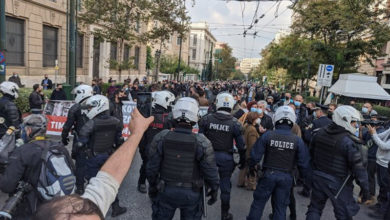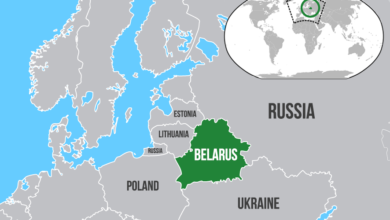For the second time this year, Greeks will go to the polls on September 20 to elect a new parliament after a dramatic period of brinksmanship, mass mobilization and capitulation on the part of Prime Minister Alexis Tsipras. The experience of the SYRIZA-led government, the first in the history of Greece to identify as part of the radical left, has created new dynamics across the political spectrum that will be put to the test in the electoral arena.
Greece has been suffering under a regime of intense austerity and capitalist economic collapse for years under the boot of the Troika—the European Union, European Central Bank and International Monetary Fund (although the IMF’s future participation is in question). In return for hundreds of billions of dollars from the Troika to bail out the big Greek banks and repay German, French and other financial institutions, the rights of poor and working Greeks have been systematically decimated and the country’s public assets have been looted. Unemployment, homelessness and poverty is rampant, and the country’s debt-to-GDP ratio remains extremely high.
Prime Minister Tsipras chose to step down and call new elections to consolidate his position and secure a mandate to implement the new austerity deal. His SYRIZA-led coalition, which includes the far-right, anti-bailout Independent Greeks party, was severely weakened over the course of the high-stakes negotiations leading up to the new agreement.
SYRIZA was elected based on their promise to simultaneously end austerity and keep Greece inside the Eurozone – the 17 countries that use the Euro common currency. German imperialism and its European partners took a hard line, and Tsipras ultimately backed down in the face of a debt default. As Liberation News noted in an earlier update: “In return for just under $100 billion, Greece will have to make it harder to retire, implement regressive taxes, surrender public assets to a third party that will preside over their privatization and take other steps to decimate the rights of poor and working people.”
The Left Platform, formerly a faction of SYRIZA that opposed the leadership’s defeatist line of ruling out a Eurozone exit under any circumstances, abstained or voted against the prior actions demanded by the Troika before the official ratification of this new memorandum. Eventually drawing in 43 of the party’s members of parliament out of a total of 149, the Left Platform forced Tsipras to rely on the votes of the opposition parties that presided over the previous bailouts. With the first Troika inspection due in October and the likelihood of accompanying austerity measures, the government had no time to waste and rushed through the procedures necessary to call snap elections.
Popular Unity founded
The decision to call elections so soon effectively closed off any avenue to strengthen a left pole inside SYRIZA. After the Left Platform ministers were expelled from the cabinet, a central committee meeting held July 31 decided to hold an extraordinary congress in September to determine the future of the party. In the middle of an election campaign, or just after one in which the left wing would be forced to campaign for Tsipras, a party congress would be meaningless.
Under the leadership of former Energy Minister Panagiotis Lafazanis, 25 members of parliament left SYRIZA and created a new party—Popular Unity. Just over one-fourth of SYRIZA’s central committee joined this new formation. According to leading member Stathis Kouvelakis, its organizational structure resembles the initial model of SYRIZA before it become a unified party following the 2012 electoral breakthrough—a coalition of ideologically distinct currents united around a common program. This includes groups not only outside of the Left Platform, but organizations that had never been part of SYRIZA in the first place.
Popular Unity, according to Lafazanis, “wants to continue the best programmatic traditions of SYRIZA. We want to stick to more radical commitments.” This means the old promise to “tear up the memorandum,” but unlike Tsipras the party is perfectly willing to exit the Eurozone to achieve this. Popular Unity is also calling for the nationalization of the banking sector and other strategic sections of the economy, a dramatic move that would seriously and positively alter the balance of power between the working class and capital.
The new organization is positioning itself as the political representative of the massive “no” vote and mobilization in the run-up to the July 5 referendum. With high-stakes negotiations far from settled, the SYRIZA government called on the people to vote to accept or reject a series of austerity measures proposed by the Troika that were quite mild in comparison with what was ultimately agreed to. In some of the largest demonstrations to take place since the crisis began, huge crowds took to the streets to reject the fear-mongering of the pro-Euro opposition and European officials. In the end, “no” won in a landslide—but this spirit of mass resistance was betrayed by Tsipras a week later.
Prospects dim for SYRIZA majority
SYRIZA’s goal is to garner enough of the vote—in the Greek electoral system about 35-40 percent—to win an absolute majority in parliament. Although based on Tsipras’ personal popularity this seemed possible a few weeks ago, recently released opinion polls show that SYRIZA will need to experience a surge in support to make this happen.
SYRIZA is polling in first place, which comes with a 50-seat bonus, but only by a few percentage points. The main opposition, right wing New Democracy, is waging an aggressive campaign attacking Tsipras for his “irresponsible” and failed negotiating tactics. Furthermore, the early election itself is unpopular. A University of Macedonia poll found that 60.5 percent of Greeks thought that the decision to force early elections would “harm the country.”
Shortly after resigning, Tsipras pledged that SYRIZA would not form a coalition with New Democracy, the formerly dominant social democratic PASOK party, or the new bourgeois centrist formation “The River.” At this point in the race, this seems highly improbable. Independent Greeks, SYRIZA’s coalition partner under Tsipras, may not reach the 3 percent threshold to enter parliament.
Understanding the weakened position his party is in, former SYRIZA Interior Minister Nikos Voutsis last weekend walked back this pledge, “Based on what we know now, we do not believe this [a coalition with New Democracy or PASOK] will be an option. Once we know the election result, though, we will examine it and decide what we have to do because there is no way we are going to go to further elections.”
Popular Unity is polling around 4-5 percent and is widely expected to enter parliament. Lacking a centralized apparatus based on cadre and therefore vulnerable to ideological dilution, much of SYRIZA’s electoral support was based on the personality of Alexis Tsipras, so the new party is able to attract fewer defections at the grassroots level than in the central committee or among parliamentarians. It does, however, have a compelling program that speaks to the needs of the people and the limitations of the existing system exposed during SYRIZA’s time in office. Zoe Constantopoulou, former speaker of parliament and one of the most prominent opponents of the new memorandum, announced on Monday that she would be supporting Popular Unity.
The Communist Party of Greece (KKE) has stuck with its sectarian approach and ruled out any kind of cooperation with Popular Unity, denouncing them as “champions of deception” and a “shock absorber” for the system. This is in line with their overall approach in the recent period: Mobilize their own base for their own actions, and sharply denounce SYRIZA. The hope was that once the masses shed their “illusions,” they would flock to the KKE.
This has not happened, even though Tsipras signed onto an agreement harsher than perhaps anyone would have expected. Polls show the KKE mired around 5 percent, where they have been since SYRIZA’s surge in 2012, and there has not been any notable polarization around the Communist Party in the extra-parliamentary struggle.
It is possible that Popular Unity will run a joint list with ANTARSYA, a coalition of several communist tendencies active in the mass movement that usually attracts 1-2 percent support in elections. In the few polls where ANTARSYA is included, its combined total with Popular Unity is greater than support for the KKE. This raises the possibility of the Communist Party being displaced as the most popular force to the left of SYRIZA, a shock that could make a strategic reorientation more attractive.
Troublingly, the neo-Nazi Golden Dawn party looks set to experience a slight boost in support—despite the fact that most of its top leadership is in prison or under house arrest. Golden Dawn combines extreme anti-immigrant racism with anti-austerity politics, and is positioned to benefit from the failure of SYRIZA and the lack of a united, revolutionary left-wing alternative.
Revolutionary consciousness comes not from experience alone but the combination of wide and profound experience with political leadership that helps the masses generalize this in a way that points to the need for the overthrow of the existing system. The seven months of SYRIZA’s government have without a doubt been a milestone in the history of the post-Cold War left, but its ramifications are far from settled. The September 20 elections and their aftermath will bring greater clarity to the meaning of this historic development.






